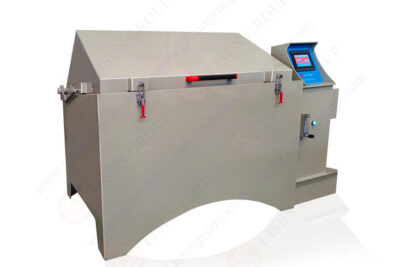
Abstract Temperature testing is crucial for the evaluation and quality control of LED lamps, ensuring compliance with industry standards and enhancing performance. This paper focuses on the LISUN TMP-16 Multiplex Temperature Tester, a state-of-the-art instrument designed specifically for LED lamp temperature testing. The discussion includes the device’s technical specifications, applications...

Abstract The Xenon Arc Lamp Accelerated Aging Test Chamber, such as the LISUN XD-80LS Xenon Lamp Aging Test Chamber, is a state-of-the-art tool designed to simulate the full sunlight spectrum, including ultraviolet (UV), visible, and infrared (IR) radiation. This technology is critical for testing material durability under different environmental conditions, such as exposure to sunlight, heat, and...

Introduction In today’s increasingly demanding industrial landscape, testing the durability and performance of products under various climatic conditions is critical to ensuring product reliability and long-term functionality. One of the most effective ways to simulate environmental stress is through the use of temperature humidity test equipment, such as the LISUN GDJS-015B Temperature Humidity...

Abstract In the field of lighting design, glare is a significant factor influencing visual comfort and safety. The ability to measure and assess glare, especially in complex environments, is crucial for ensuring optimal lighting. This paper explores the use of the LISUN GTS-LS Glare Test System, which utilizes F24-70mm lenses and fish-eye lenses for glare measurements in both outdoor disability gl...

Abstract Surge testing, particularly in the context of lightning strikes and power-line surges, is a critical aspect of ensuring the reliability and durability of electrical and electronic equipment. According to the international standard IEC 61000-4-5, equipment must withstand surges caused by lightning or other transient over-voltage events. The surge immunity test is conducted to evaluate the ...

Abstract This paper discusses the evaluation of materials and their protective layers’ resistance to sulfur dioxide (SO2) corrosion using the SO2 Corrosion Test Chamber, specifically the LISUN SQ-010 Sulfur Dioxide Test Chamber. The focus is on understanding the effectiveness of various materials and coatings in environments exposed to SO2, simulating industrial or atmospheric conditions tha...

Introduction The ever-growing demand for electronic devices has led to an increased focus on ensuring the reliability and safety of their accessories, particularly chargers. As consumers rely on chargers to power their devices, manufacturers must ensure these chargers can withstand prolonged usage under various conditions. One of the most effective ways to test a charger’s longevity and function...

Introduction The Lamp Cap Temperature Rise Test System plays a critical role in ensuring the safe and reliable operation of lighting devices, specifically testing the working temperatures of lamp caps, burners, and other related components. Temperature rise tests are a key part of the safety and performance verification process for lamps, as excessive heat can lead to potential hazards such as ele...

Introduction In the field of electrical safety testing, the tracking resistance of insulation materials is an important criterion for evaluating their performance under high voltage and environmental stress. The phenomenon of tracking refers to the gradual deterioration of an insulating material’s surface due to leakage current, resulting in damage and potential failure. This process is of parti...